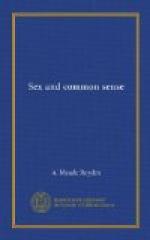Now, all of these three conclusions are lies; and, therefore, we set out in life equipped with a lie in our souls. It is not a good beginning. It means that almost at once those of us who persist in our desire to know are in danger of losing our self-respect. We learn that there is something in sex that is base—so base that even our own parents will not speak to us about it; and because of that, and because a child instinctively does accept, during the first few years of its existence, what its parents or guardians say, we assume that there must be something bad in us, since we so persistently desire to know what is so evil that nobody will speak of it at all. Or if anyone does allude to it, it is with unwholesome furtiveness and a rather silly kind of mirth, so as to increase in the minds of many of us the sense that there must be something in our nature that we cannot respect because nobody else finds it beautiful or respectable.
Our next step, especially if we are conscientious people, is to repress that something. And here I want to say a word in answer to a number of letters that I have had on the point which I raised early in this book, when I claimed that women have to pay as great a tax and suffer as great a hardship from repression as men do. People—both men and women—have written to say that this is not true, and to such I wish to make my point quite clear. I did not say that men and women suffered in the same way. I said that they suffered equally; and since the question has been raised, I should like just to answer it here. To me it seems, judging as far as I can, from the people that I know, that—speaking very generally—passion comes to a man with greater violence, and is more liable to leave him in peace at other times. Passion is to a man who is of strong temperament like a storm at sea. It seems the very embodiment of violence and force. The mere sight of the sea angry almost terrifies one, even if one is perfectly safe from the violence of the storm; but the depths are not stirred. And in the case of a woman I would take a different figure of speech altogether, and say that very often the strain on her is much less dramatic, much less violent, and more persistent. I think of the strain as something like that silent, uninterrupted thrust of an arch against the wall, of a dome on the walls that support it. There is no sign of stress. But it is so difficult to build a dome rightly that Italy, the land of domes, is covered with the ruins of those churches whose domes gradually, slowly, thrust outwards till the walls on which they rested gave way and the church was in ruins. That kind of strain is easily denied by the very people who are enduring it. It is so customary, so much a part of their life, that they are unconscious of it.




